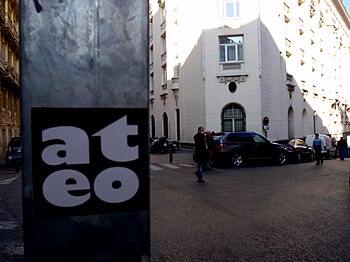 |
| Atheist sticker in Madrid in 2008. (Photo credit: Wikipedia) |
I read a number of atheist blogs and sometimes find certain posts so fascinating that I want to do more than just leave a comment. A post on Separation of State and Superstition (update: link no longer active) caught my attention and sparked the post you are now reading.
In the post, David suggested that the word "atheist" has acquired so much negative baggage that it might be time to replace it with an alternative term. I believe that this may have been the rationale underlying the brights movement. Instead of "brights," David suggests that we consider replacing "atheist" with "not superstitious."
David is correct that "atheist" has acquired a negative connotation, but I am not in favor of abandoning its use. Replacing the atheist label with something else will not remove the negative association; it will simply create additional confusion. Instead, we need to do better at defining and explaining atheism.
I am sticking to my previously expressed agreement with George Smith and defining atheism as a lack of theistic belief. When I say "I am an atheist," I am saying that I do not believe in gods of any sort. In other words, I do not accept the proposition "God(s) exist(s)" as true. The theist has not made an adequate case to establish the veracity of this proposition. Thus, identifying myself as an atheist means that I do not accept the claim that gods exist (i.e., theism).
In addition to being an atheist, I am also a naturalist (or materialist, if you prefer) in the sense that I do not believe in anything that might be characterized as supernatural. I suppose this is where some of the "not superstitious" part might come in; however, I suspect that would also extend into things like reason and critical thinking. It would be a mistake to explain atheism as meaning a rejection of anything supernatural, for some atheists believe in supernatural entities other than gods. Similarly, it would be a mistake to claim that atheism entails a rejection of superstition. I could easily be an atheist and a superstitious person, believing in luck and engaging in meaningless rituals to obtain it (e.g., consider the rituals many baseball players go through before batting).
Because I could be an atheist and a naturalist and still be superstitious (e.g., believing in luck, fate, astrology, etc.), I need at least one more component. I need a commitment to reason and skepticism as the path to knowledge. In this way, I set criteria for truthfulness that requires rationality and evidence. Irrational beliefs are by definition rejected. Now luck, psychic phenomena, and other examples of superstition (including religion) can be swept aside. In fact, they must be swept aside because they are irrational and lack sufficient evidence.
I am an atheist, but I am also a naturalist, a skeptic, and one who strives to be rational. Rather than trying to replace atheism with an alternative term that means much more than atheism, I think we should be prepared to explain that atheism is merely one small part of our worldviews and that many other components are necessary to convey all we believe.